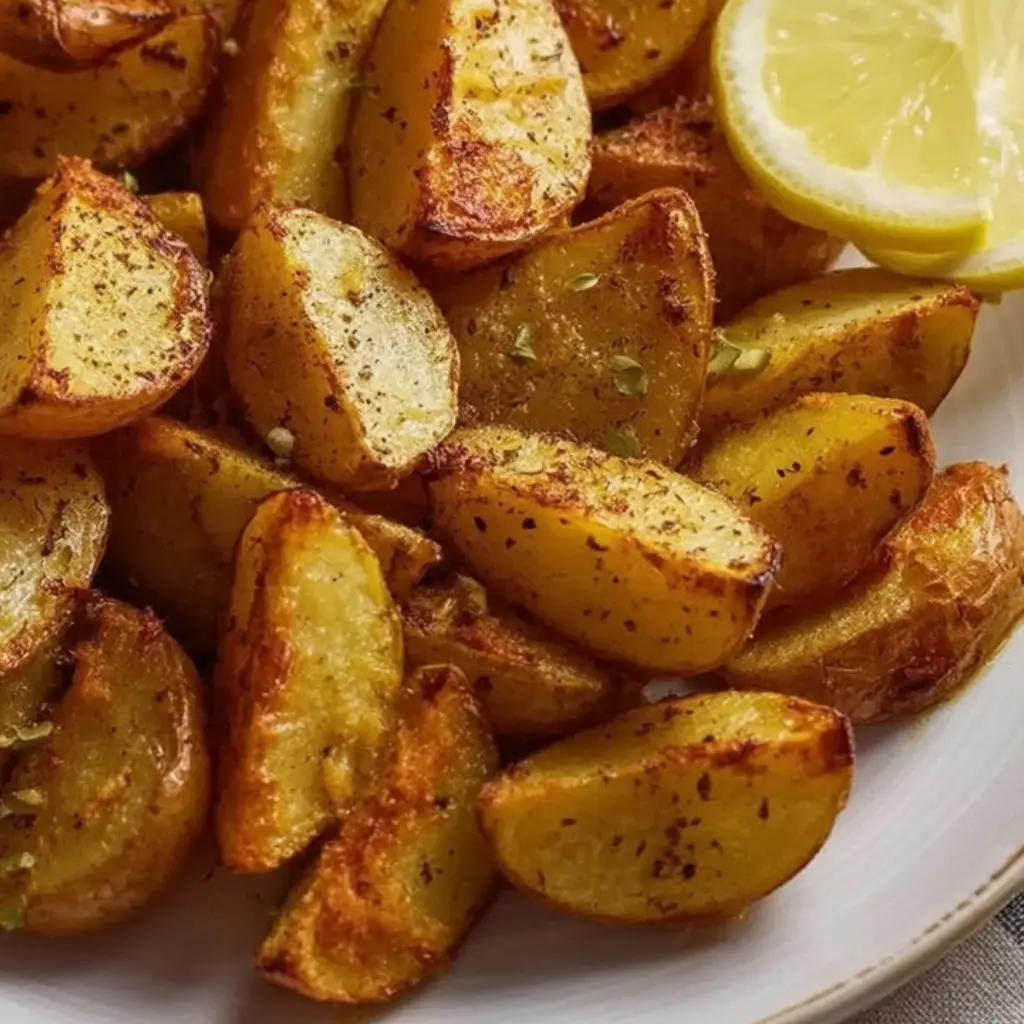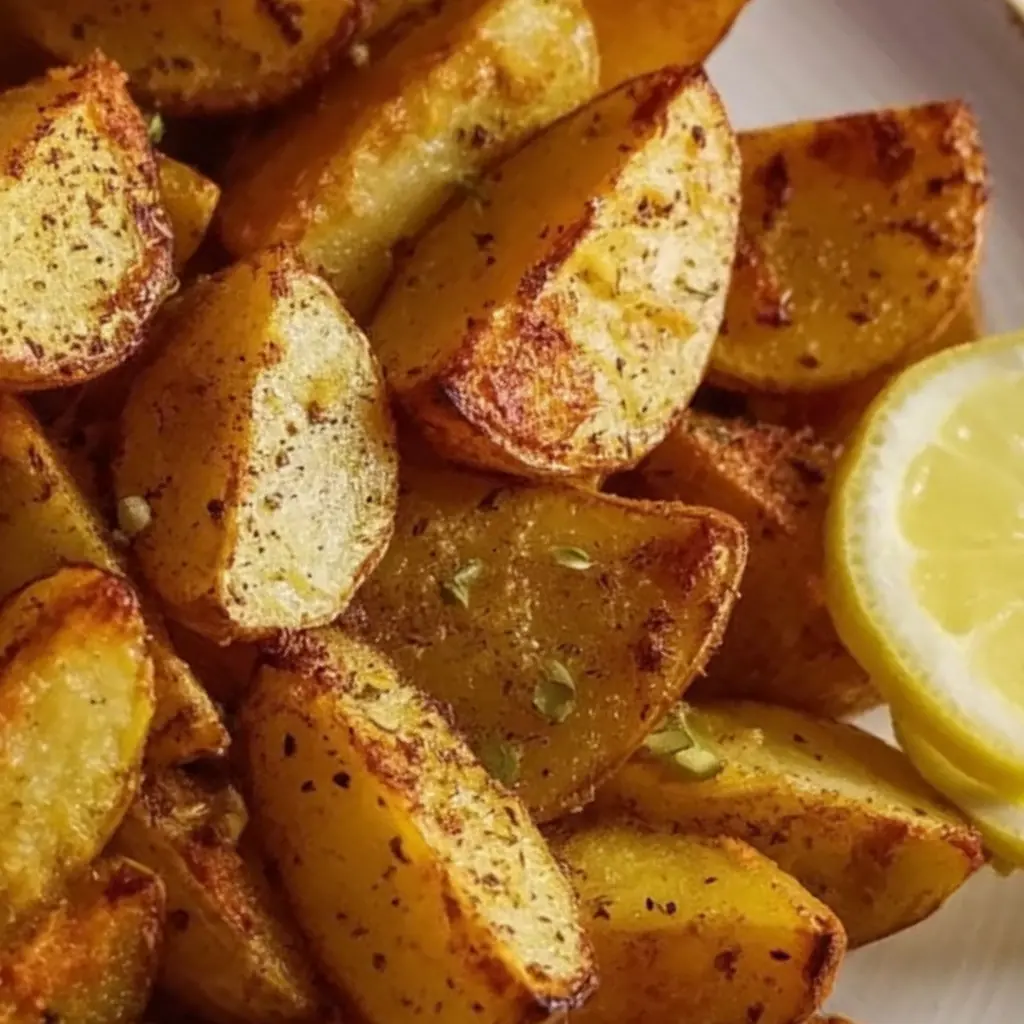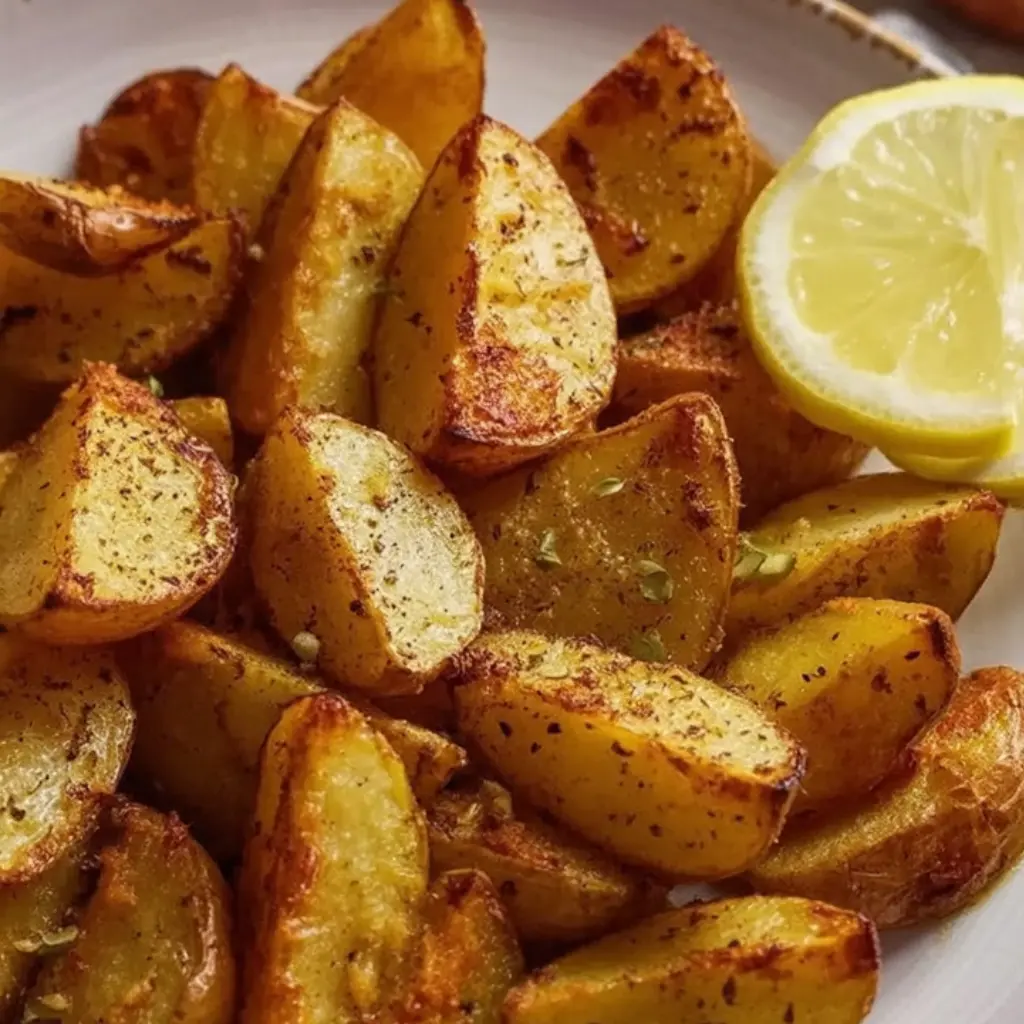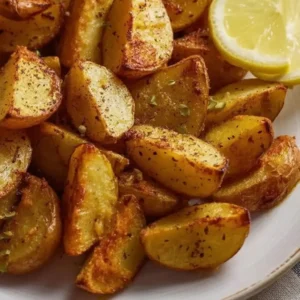I first fell in love with Greek lemon potatoes on a trip that had nothing to do with Greece at all. Years ago, I was invited to a neighbor’s dinner party where the centerpiece wasn’t lamb or roasted chicken, but a humble tray of golden potatoes. They were unlike any potatoes I had ever tasted—tender in the middle, with edges that carried the slightest crisp, all wrapped in a bright, lemony flavor that lingered long after the last bite.
I remember asking for the recipe, only to be met with the classic, “Oh, it’s nothing, just a little lemon and olive oil.” Well, it turns out, it’s never just lemon and olive oil. That night sparked my quiet obsession with trying, failing, and eventually mastering this dish at home. Over the years, I’ve scorched a pan or two, made batches that were far too soggy, and even once forgot the garlic altogether.
But those missteps are exactly what make me cherish this recipe now—because when it finally turns out right, you’ll know it’s worth the journey.

Why You’ll Love This Recipe
- Simple ingredients, big flavor
- Affordable and pantry-friendly
- A side dish that can steal the spotlight
- Make-ahead friendly and great for leftovers
- Comforting enough for weeknights, elegant enough for gatherings
Ingredients You’ll Need
Potatoes: Russet or Yukon Gold are my go-to. Russets soak up the lemony broth beautifully, while Yukons hold their shape a little better. I’ve even mixed the two when I didn’t have enough of one, and it worked out just fine.
Lemons: Fresh is non-negotiable here. Bottled lemon juice won’t bring the same brightness. I usually zest the lemon too, because why waste all that fragrant flavor?
Olive Oil: A good-quality olive oil makes all the difference. Don’t worry—it doesn’t need to be the most expensive bottle, just one that tastes pleasant on its own.
Garlic: I like to smash a few cloves instead of mincing them, so they infuse the broth without burning.
Chicken Broth: Adds depth and keeps the potatoes from drying out. If you’re vegetarian, vegetable broth works nicely too.
Oregano: Dried oregano is traditional and dependable. I sometimes add a pinch of fresh oregano at the end for fragrance.
Salt and Pepper: Be generous with both. Potatoes can handle more seasoning than you might expect.
How to Make It (Step-by-Step Instructions)
Start by preheating your oven to 400°F. A hot oven is key here; it gives the potatoes a chance to soak in the lemon broth while still developing some golden edges.
Peel and cut your potatoes into wedges. I prefer chunky wedges rather than thin slices—they hold up better during roasting and give you that soft center with crisped edges.
In a large baking dish, whisk together olive oil, freshly squeezed lemon juice, smashed garlic cloves, oregano, salt, pepper, and chicken broth. This liquid should taste boldly seasoned, even a little punchy, because the potatoes will mellow it out as they cook.
Add the potato wedges to the dish and toss them until each piece is well-coated. Spread them out in a single layer so they roast evenly.
Now, the patience part. Cover the dish tightly with foil and bake for about 40 minutes. This first stage is all about letting the potatoes absorb the flavorful broth. When you pull the foil off, don’t be surprised if they look pale and soft—it’s expected.
Once uncovered, return the dish to the oven for another 30–40 minutes, stirring once or twice so the potatoes brown evenly. By the end, the liquid will have reduced to a glossy coating, clinging to each wedge. If you’re lucky, you’ll get a few pieces with that irresistible caramelized edge at the bottom of the pan.
Taste, adjust seasoning if needed, and finish with a sprinkle of fresh oregano or parsley before serving.

Expert Tips for the Best Results
The trickiest part of Greek lemon potatoes is finding that balance between tender and crisp. I’ve learned that cutting the potatoes too thin leads to soggy results, while rushing the roasting time robs them of that creamy interior. Keeping them chunky, using enough liquid, and giving them plenty of time in the oven makes all the difference. Don’t be shy with the lemon either—if you think you’ve added enough, you might just need a little more.
Variations & Substitutions
There have been plenty of nights when I didn’t have everything on hand, and the dish still worked. Once, I swapped chicken broth for plain water and simply added an extra drizzle of olive oil and more seasoning, and it was rustic but satisfying. Another time, I tried adding a splash of white wine to the broth, and it gave the potatoes a lovely depth that made the meal feel just a bit fancier. If you’re out of oregano, thyme brings a softer, earthier flavor. And if you prefer a sharper punch, toss in a few slices of red onion to roast alongside the potatoes—the sweetness that develops is a pleasant surprise.
Serving Suggestions
These potatoes shine on their own, but I find they’re at their best alongside roasted chicken or grilled fish. They also hold their own at a holiday table, nestled between lamb and green beans. On busy weeknights, I’ve paired them with nothing more than a crisp salad and some bread, and nobody complained. Their versatility is part of the charm—you can dress them up for company or keep them simple for a cozy family dinner.
Storage & Reheating Instructions
In my kitchen, leftovers rarely last long, but when they do, I tuck them into an airtight container and refrigerate them for up to three days. When reheating, the oven works best—it revives the edges and keeps the texture close to what it was fresh out of the oven. The microwave will warm them through, but expect them to be a little softer. I sometimes crisp them up in a skillet with a drizzle of olive oil, which brings back that golden finish beautifully.
Recipe FAQs (Answered by Clara)
Can I make this ahead of time?
You sure can. I often prepare the potatoes in the morning, cover them, and refrigerate until it’s time to bake. They actually benefit from sitting in the lemon mixture.
Do I need to peel the potatoes?
Not at all. I usually peel them because that’s traditional, but if you like the rustic look and added texture, leaving the skins on works fine.
Can I double the recipe?
Yes, but make sure you use a large enough pan. Crowding the potatoes will prevent them from roasting properly. Two separate pans usually work better than one very full pan.
What if my potatoes are too watery?
It usually means they needed a little more time uncovered in the oven. Let them roast longer to reduce the liquid until it clings to the potatoes.

Conclusion
Greek lemon potatoes have become one of those recipes I return to again and again—not just because they taste wonderful, but because they remind me of the joy in simple cooking. Every batch tells a little story, whether it’s the first time you try them or the fiftieth. I hope you’ll give this recipe a place at your table, and if you do, I’d love to hear how it turned out for you. Share your version, make it your own, and most importantly, enjoy the process.
Nutrition Information (per serving, based on 6 servings)
Calories: 230
Fat: 9g
Carbohydrates: 34g
Protein: 4g
Sodium: 420mg
Fiber: 4g

Greek Lemon Potatoes
Ingredients
- 3 lbs about 6 medium Yukon gold or russet potatoes, peeled and cut into wedges
- ⅓ cup olive oil
- 4 cloves garlic minced
- ½ cup chicken broth or vegetable broth
- ⅓ cup fresh lemon juice about 2 lemons
- 1 tsp dried oregano or 1 Tbsp fresh
- 1 tsp salt
- ½ tsp black pepper
- 2 Tbsp fresh parsley chopped (for garnish)
Instructions
- Preheat oven: Preheat oven to 400°F (200°C). Lightly grease a large roasting pan.
- Prepare potatoes: Peel and cut potatoes into thick wedges. Place in the roasting pan in a single layer.
- Make lemon mixture: In a small bowl, whisk together olive oil, garlic, broth, lemon juice, oregano, salt, and pepper.
- Coat potatoes: Pour mixture over the potatoes, tossing to coat evenly.
- Roast: Bake uncovered for 60–70 minutes, flipping potatoes halfway through and basting with pan juices until golden and crispy on the edges.
- Finish and serve: Sprinkle with fresh parsley before serving.
Notes
- For extra crispy potatoes, broil for the last 3–4 minutes.
- Works best with Yukon gold or russet potatoes.
- Can be made ahead and reheated in the oven at 375°F (190°C) for 15 minutes.
- Pairs perfectly with grilled meats, roasted chicken, or Greek salad

